
Crowded House are a rock band, formed in Melbourne, Victoria, Australia, in 1985. Its founding members were New Zealander Neil Finn and Australians Paul Hester (drums) and Nick Seymour (bass). Later band members include Neil Finn's brother, Tim Finn and sons Liam and Elroy, as well as Americans Mark Hart and Matt Sherrod, with Neil Finn and Seymour being the sole constant members.
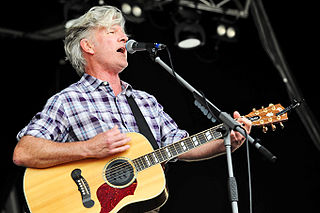
Brian Timothy Finn is a New Zealand singer, songwriter, musician, and composer. He is best known as a founding member of Split Enz. Finn founded the band in 1972 with Phil Judd and served as lead singer and principal songwriter. Following Judd's departure in 1977, he was joined by brother Neil. Finn wrote or co-wrote some of the band's best-known songs, including "I See Red" and "Six Months in a Leaky Boat". While still a member of Split Enz, he began a solo career, scoring the two hits "Fraction Too Much Friction" and "Made My Day" in 1983; he left the band in early 1984, briefly returning for their farewell tour later that year.
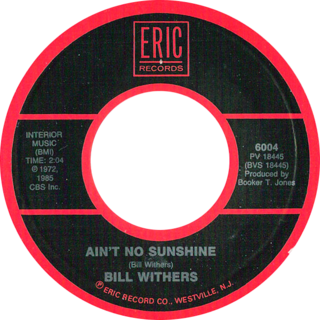
"Ain't No Sunshine" is a song by Bill Withers from his 1971 album Just As I Am, produced by Booker T. Jones. The record featured musicians Donald "Duck" Dunn on bass guitar, Al Jackson Jr. on drums and Stephen Stills on guitar. String arrangements were done by Booker T. Jones. The song was recorded in Los Angeles, with overdubs in Memphis by engineer Terry Manning.

"You're in My Heart (The Final Acclaim)" is a song written and recorded by Rod Stewart for his 1977 album Foot Loose & Fancy Free. The song become a hit, reaching the top ten of many countries, including the United States (number 4), Canada (number 2), and Australia, peaking at number 1 for one week.
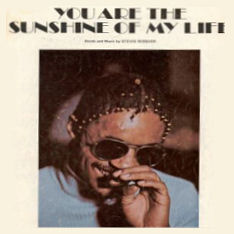
"You Are the Sunshine of My Life" is a 1973 single released by Stevie Wonder. The song became Wonder's third number-one single on the Billboard Hot 100 chart and his first number-one on the Easy Listening chart. It won Wonder a Grammy Award for Best Male Pop Vocal Performance, and was nominated for both Record of the Year and Song of the Year. This song was the second single released from the 1972 album entitled Talking Book, which stayed at number one on the R&B albums chart for three weeks.
"Two Little Boys" is a sentimental song about two friends who grow up to be soldiers. Recorded as early as 1903 in the United States, it became an international hit for Australian Rolf Harris 66 years later. It was published in 1903 by American composer Theodore F. Morse and lyricist Edward Madden.

Push Push are a rock band formed in the 1990s from Auckland, New Zealand. They are best known for their single "Trippin'".
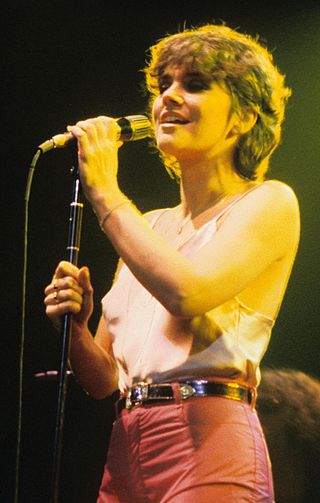
The singles discography of American singer Linda Ronstadt contains 80 lead and collaborative singles, four as a featured artist, eight promotional singles and eight other charted songs. Her first credited release was 1967's "Different Drum", which also included the Stone Poneys along with Ronstadt as a featured artist. Ronstadt's first pair of solo singles were released by Capitol Records in 1969. The 1970 release "Long, Long Time" was her first solo charting single. Her 1974 single "You're No Good" topped the US Hot 100, reached number seven in Canada and number 15 in Australia. Its B-side song "I Can't Help It " reached number two on the US Hot Country Songs list. It was followed by 1975's "When Will I Be Loved", which made the top ten on multiple charts in the United States and Canada, including topping their country surveys. It was followed by the US top five song "Heat Wave" and the US country top five song "Love Is a Rose".

"Good Times" is a song by the Australian rock band the Easybeats, written by George Young and Harry Vanda. It was released in June 1968 on their album Vigil, and as a single in July 1968 through Parlophone. It features guest vocals by Steve Marriott of Small Faces, and piano by Nicky Hopkins. The original Easybeats recording reached #22 in Australia. When broadcast by BBC radio, it was reportedly heard by Paul McCartney on his car radio; McCartney apparently rang the station immediately to request a repeat playing.

"Message to My Girl" is a song by New Zealand art rock group Split Enz. It was released in January 1984 as the second single from their ninth studio album Conflicting Emotions.
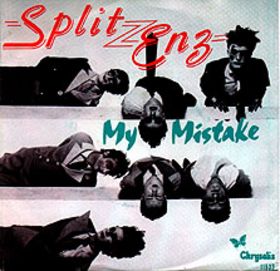
"My Mistake" is a 1977 song by New Zealand art rock group Split Enz. It was released in September 1977 as the lead single from their studio album Dizrythmia.

Virginia Claire Wigmore is a New Zealand singer and songwriter. Featured on the Smashproof single "Brother" in 2009, Wigmore went on to release five albums Holy Smoke (2009), Gravel & Wine (2011), Blood to Bone (2015) and Ivory (2018), with the first three having been chart-toppers on the New Zealand Albums Chart. She is known for her high pitched and raspy voice.

"My Elusive Dreams" is a country music song written by Billy Sherrill and Curly Putman. Putman recorded his song in March 1967 and released it on ABC Records in June 1967, peaking at #41 on the Hot Country Singles charts and #34 on the Bubbling Under Hot 100. The song was later recorded by several artists. The best-known version was recorded as a duet by David Houston and Tammy Wynette, and was a No. 1 country hit in October 1967; the song also peaked at No. 89 on the Billboard Hot 100. Wynette recorded a second duet version of My Elusive Dreams in 1973 with George Jones; this version was included on the Let's Build a World Together album.
"You Take My Breath Away" is the debut single by singer-actor Rex Smith and the first release from his third studio album Sooner or Later which is also featured in the 1979 made-for-television film of the same title starring Smith and Denise Miller. It was produced by Charles Calello and Stephen Lawrence, and written by Lawrence and Bruce Hart.

Stan Walker is an Australian-born New Zealand singer, actor, and television personality. In 2009, Walker was the winner of the seventh season of Australian Idol. He subsequently signed a recording contract with Sony Music Australia. In December 2009, Walker released his debut studio album, Introducing Stan Walker, which included the hit single, "Black Box". The album debuted at number three on the Australian ARIA Albums Chart and was certified platinum by the Australian Recording Industry Association (ARIA). It also appeared on the New Zealand Albums Chart at number two and was certified triple platinum by the Recording Industry Association of New Zealand (RIANZ).
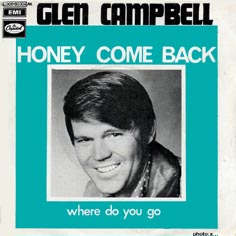
"Honey Come Back" is a song written by Jimmy Webb, and recorded by the American country music artist Glen Campbell. It would become a major hit for him.

"The Music Goes 'Round My Head" is a 1967 song and single by Australian rock group The Easybeats, which was written by band members George Young and Harry Vanda.

"How Do You Talk to Boys" is a song by New Zealand singer and songwriter Sharon O'Neill. The song was released in August 1980 as the final single from the international edition of her second studio album Sharon O'Neill titled Words (1980).
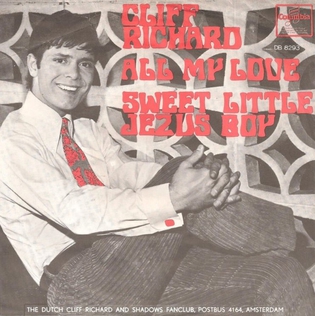
"All My Love" is a song first recorded in English by Cliff Richard and released as a single in November 1967. The song is an adaption of the Italian song "Solo Tu", written by Federico Monti Arduini and first released by Orietta Berti in April 1967. The song was adapted to English by Peter Callander.

"Blue Day" is a song by New Zealand group Mi-Sex, released in February 1984 as the second single from their fourth studio album, Where Do They Go? (1983). The song peaked at number 24 in Australia.


















